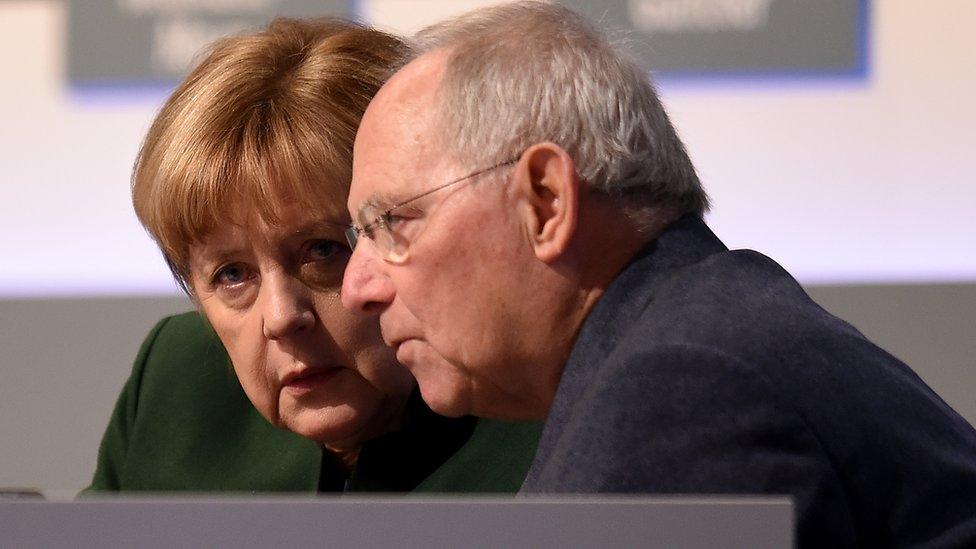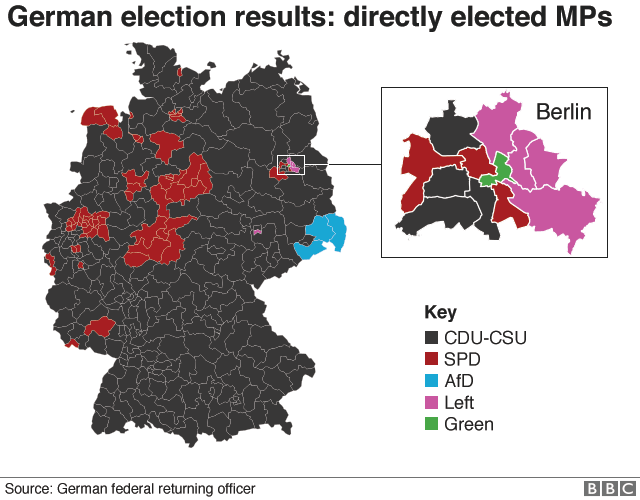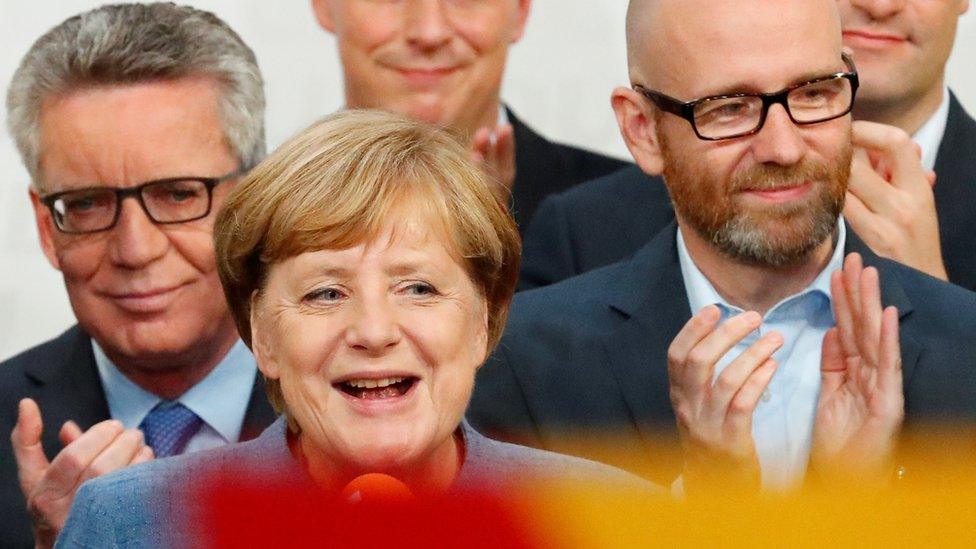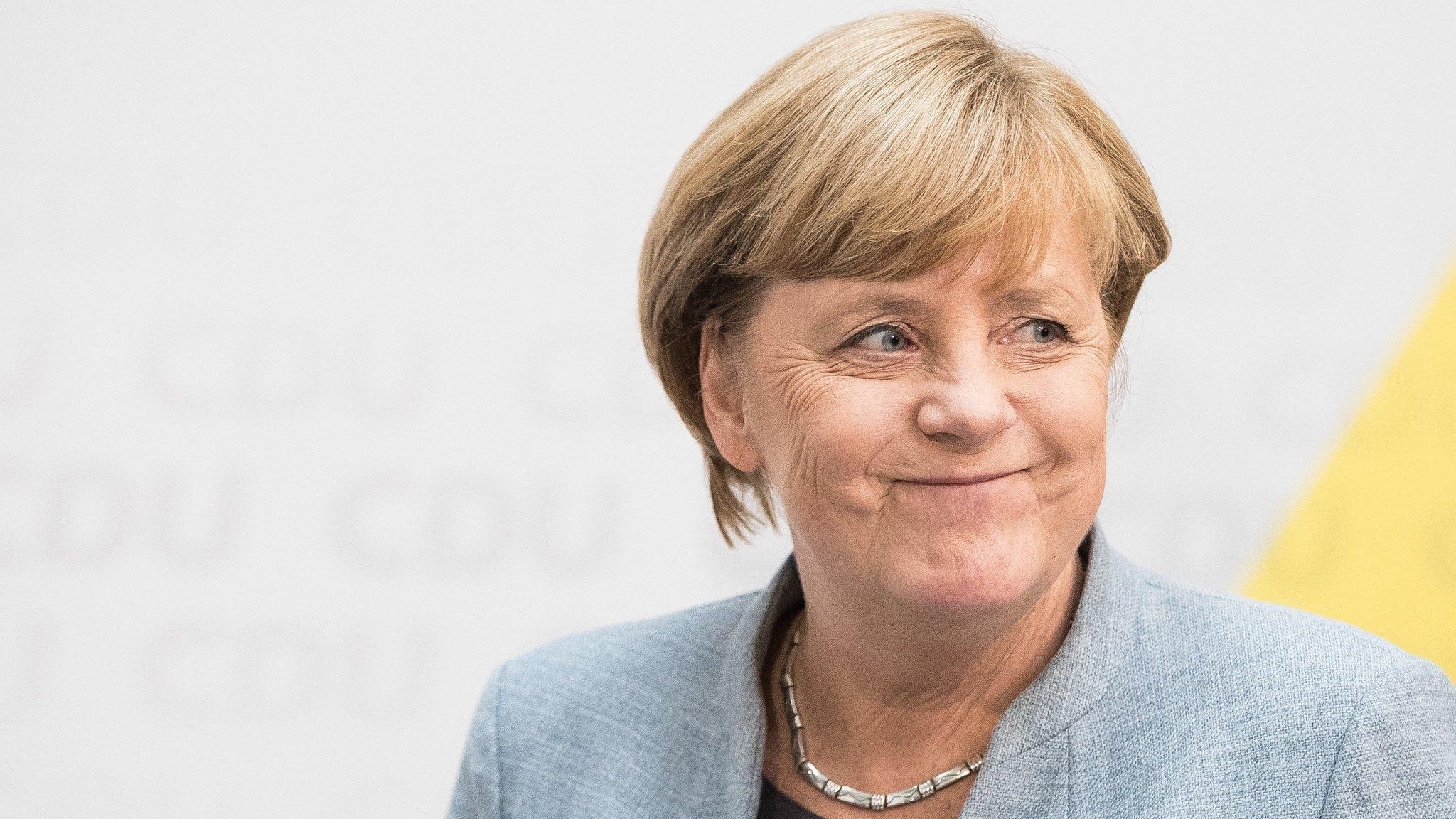German election: Schäuble loses job in Merkel coalition bid
- Published

Wolfgang Schäuble's job is coveted by possible coalition partners, particularly the pro-business FDP
After eight years as finance minister, Wolfgang Schäuble is to leave the post in the aftermath of the German election, as Chancellor Angela Merkel tries to build a new coalition.
The job is seen as second only to the chancellor, and Mr Schäuble became widely known in Europe for championing austerity during the eurozone crisis.
Mrs Merkel's Christian Democrat CDU suffered heavy losses on Sunday.
She now faces a tough task in pulling together a workable German government.
Choosing Mr Schäuble's successor will now become an important part of coalition talks. The finance ministry is known to be coveted by the pro-business FDP, and could be filled by its leader, Christian Lindner, or by the Greens.
The most likely coalition for the chancellor's Christian Democrat CDU is with the FDP and the Greens. If the chancellor fails to reach a deal in coming months, Germany could face fresh elections.
Uncertainty after the German election sent the euro to its lowest level for a month on Wednesday.
Mr Schäuble, 75, has been an influential figure in recent years, insisting on economic reform in Greece in return for eurozone bailouts and ruling out the prospect of debt relief.

A CDU member of the Bundestag since 1972, he has now been asked to become president of the Bundestag next month.
Commentators have suggested Mr Schäuble could use his political experience to control heated debates in parliament involving the right-wing nationalist AfD, elected to the Bundestag for the first time.
'Change of course'
Leaders and protesters react to the election result
Mr Lindner told Die Welt newspaper that the arithmetic added up for a coalition with Mrs Merkel's party and the Greens, but his party's election mandate required "a change of course in German politics".
With the centre-left Social Democrats ruling out a coalition, the only deal likely to work would be a so-called Jamaica coalition, named after the black, yellow and green colours of the parties involved: the black CDU, yellow FDP and the Greens.
Whether or not Mr Schäuble's departure was the change of course Mr Lindner was looking for, the FDP welcomed the step as a positive signal from the chancellor and said they would gladly take over the position.
However, Mr Lindner's party disagrees with the Greens on Europe, education and migrant policy.
Big differences on migrants
Mrs Merkel does not just face an uphill struggle with potential coalition partners.
She will also have to reach a compromise on immigration with the CDU's sister party in Bavaria, the CSU, which suffered big losses in Sunday's elections and faces a key vote for the Bavarian state assembly next year.
Bavaria is the arrival point for most irregular migrants to Germany, and the right-wing nationalist AfD, which ran on an anti-immigration platform, picked up 12.4% of the vote, attracting voters from the CSU - which saw a fall in support of more than 10 percentage points to 38.8%.
CSU boss Horst Seehofer refused to resign when he faced party colleagues on Wednesday.
The CSU is seeking an annual cap of 200,000 migrant arrivals, but Mrs Merkel is opposed to a limit, and the Greens vehemently reject it.
"The CSU will have to take this on board if it's serious about Jamaica," Green leader Simone Peter warned.
The FDP wants a Canadian-type points-based immigration system, dependent on a migrant's job qualifications, while the Greens want to allow family reunions.
French president makes task harder
Mrs Merkel also faces a difficult task in finding common ground on Europe, particularly after a speech on Tuesday by French President Emmanuel Macron.
Mr Macron called for the eurozone to have its own finance minister and budget, as well as for an EU asylum agency, a beefed-up border guard and a common military strategy. If any of his ideas are to work, he will need the support of the next German government.
But Christian Lindner of the FDP has firmly rejected any common eurozone budget if it means making automatic financial transfers from wealthier eurozone countries to poorer ones.
The Greens are in favour of several of Mr Macron's plans but the CSU in Bavaria is opposed to new EU institutions such as a eurozone finance minister.

- Published25 September 2017

- Published26 September 2017

- Published25 September 2017
